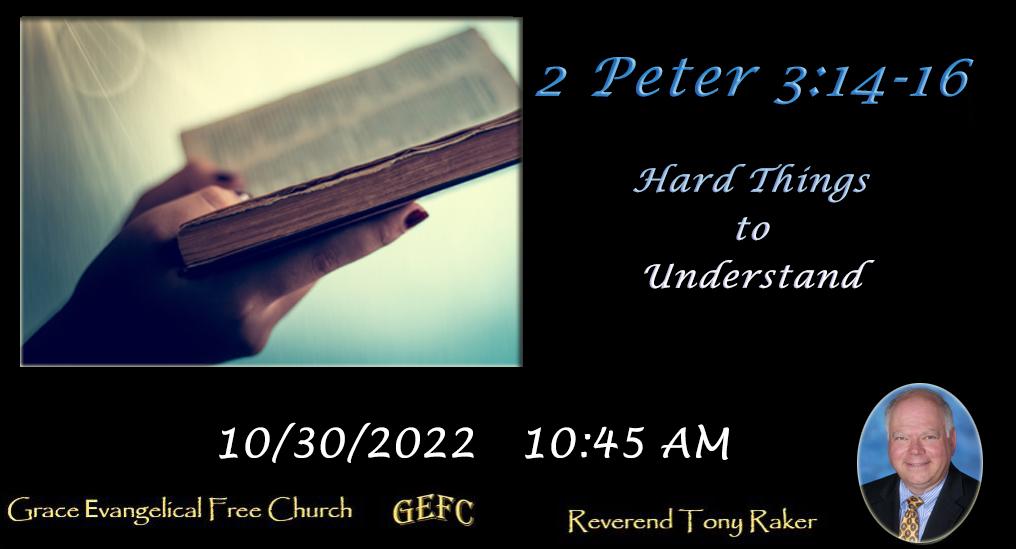
2 Peter 3:14-16 Hard Things to Understand
Peter’s reference in 2 Peter 3:16 to “some things hard to understand” has to do with the scriptures – specifically to Paul’s writings in circulation and recognized as having the stamp of divine authority. The point Peter makes is that there are many things in these inspired writings that are hard to understand. What do we learn from this fact, and from this phrase in particular:
(1) There are some things in the Bible that are hard to understand. If anybody boasts that he can easily and at once understand all that is recorded and revealed, do not believe him! Some parts are very hard to understand, and we are not surprised that this is so, for the Bible is God’s book. As author, He is infinite. Is it likely that we would understand all His mind and will?
(2) These things in the Bible that are hard to understand can be understood. Peter does not say we cannot understand them; what he says is that they are “hard to understand”. We can understand the times (1 Chronicles 12:32); we can understand the Lord’s will (Ephesians 5:17); we can be filled with all spiritual understanding (Colossians 2:2). Although it is not easy to understand spiritual truth, it is not impossible.
(3) It is only possible to understand the Bible and spiritual truth by the spiritual illumination of the Holy Spirit (1 Corinthians 2:14; Matthew 16:15-17; Ephesians 1:18). Every time we read the Bible, we need to pray the prayer in Psalm 119:18.
2 Peter 3:16b: “…There are some things in them that are hard to understand….”
- Grammatical Usage: “hard to understand” or in the Greek, “dusnoétos” meaning, “difficult to grasp, mentally process, intellectually comprehend the true sense.”
- Literal Interpretation: “…These are some things in them that are difficult to grasp, mentally process and comprehend in their truest sense….”
- Contextual/Comparison: God keeps His Word: God continually uses His Word. Peter cites seven points hard to understand:
- The Second Coming of our Lord and Savior Jesus Christ (vv. 3-4)
The writer says that in the last days there will be those who will scoff at the very idea of a second coming of Christ; they will be skeptical, ‘write off’ the whole idea. Many find the subject of the Lord’s return a difficult one, but it is clearly revealed that Jesus, who came the first time (Hebrews 9:26) will come again (Hebrews 9:28). Hundreds of Old Testament prophecies remain unfulfilled until He comes, and then they will be literally fulfilled. The subject of the second coming is “hard to understand”, but we must be sure of it and be ready for it (vv. 10-11).
- The Genesis account of the Creation (vv. 5-6)
Here again is a subject which is “hard to understand”; scientists are doing all they possibly can to discredit the Biblical account of the world and of man, as we have it in Genesis 1-2. They say it is out-of-date. The tragedy is that they cannot give us any proven explanation as to the creation of the world and of man; they say the Bible is not true; they assert our ancestors were apes or monkeys – but Genesis 1:26 and 2:7 provide us with a far more satisfying explanation (compare Genesis 1:1 and John 1:1-2).
- The Judgment of God upon Early Man (v. 6)
It is hard to understand how and why God could and should have brought terrible judgment upon the early civilization, but in Genesis 6-8, we have the historical record of this event. Remember that because God is holy and righteous He cannot condone sin; He must judge sin and punish sinners. He did this in Noah’s day, and His hatred against sin is seen at Calvary, where we also see His wonderful love for sinners (Romans 5:8). There will never be another flood over the whole earth, for the rainbow guarantees this (Genesis 9:13); but there will be judgment, and the future judgment will be by fire (vv. 7; 10; Joel 2:30).
- The Day of Judgment (v. 7)
We read of judgment and punishment that will fall upon ungodly men and women who, having refused to respond to God’s love and to believe on the Lord Jesus Christ, will be banished from God’s presence (Revelation 20:11-15). How can a God of love deal so drastically with sinners? If God is God, and if He is righteous, holy and just, how can He ignore the fact of sin and the willful disobedience of sinners? We can be quite sure that all that God does will be in full accord with His justice and mercy (Genesis 18:25; 2 Peter 3:9).
- The Hastening of the Day of God (v. 12)
Is it possible for us to ‘urge on’ the coming of the Lord? Yes, it is, for His coming awaits the preaching of the gospel to all nations (Matthew 24:14); the gathering of the elect (Acts 15:13-14); and by preaching the gospel and seeking the salvation of souls we may actually hasten the time when the Lord will come.
- The new heavens and the new earth (v. 13)
It is difficult to understand how this word of God will be fulfilled, but where shall we be when it comes about? It will help to read the whole of Revelation 21.
- The security of the child of God (vv. 16-18)
Is it possible for a believer to fall away and be lost? Do the words in verse 17 about “falling from your secure position” suggest that a Christian can after all be lost? The answer is an emphatic – no! (See John 10:28-30; Philippians 1:6; Jude 24).
- Conclusion: Are you secure in God? Casting off doubt? Today is the day to believe.
